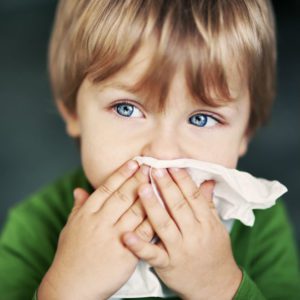It’s December — we’re right in the middle of the cold and flu season. Colds are probably the leading cause for sick visits in our office during the school year. Here are some answers to common questions I get from parents about colds:
My child keeps getting sick. Is there something wrong with my child’s immune system?
While adults get on average 3-4 colds a year, children get more. Children under 2 can get up to 8-10 colds a year. School age kids fall somewhere in between. The majority of colds occur during the fall, winter and spring. There are more than 200 viruses that can cause colds. Viruses spread from person to person through the air and close personal contact. You can also get infected by touching a surface, like a doorknob, that has respiratory viruses on it and then touch your eyes, nose, or mouth. Children are in close contact with others in daycare settings and school. So, it’s true — many children do have multiple colds over the winter but this is not abnormal and not necessarily a cause for concern.
The mucous coming from my child’s nose is green. Do they need an antibiotic?
There is a natural progression for colds. When viruses first infect the nose and sinuses (the air filled pockets in the face), the nose starts making clear mucus. This is your body’s way of trying to wash the virus out. After a couple days the mucus may change to white, yellow, or green. This is normal and does not mean there is a bacterial infection. The color comes from white blood cells that have come to fight the viral infection. With time the mucus goes back to clear and then goes away. Colds typically last between 7-10 days but can last as long as 2 weeks.
My child has a fever. Should I be concerned?
Fever can be a symptom of a cold just like sneezing, stuffy nose, runny nose, sore throat, coughing, watery eyes, and post-nasal drip (mucous dripping down the back of the throat). If fever comes at the beginning of a cold, it is not necessarily a cause for concern. It is one of the ways the body tries to rid itself of the virus. Fevers with viral illnesses such as colds tend to last 1-3 days (sometimes a little longer) and range between 101-104 degrees Fahrenheit. They tend to respond well to fever-reducers such as acetaminophen (Tylenol) or ibuprofen (Motrin, Advil). Children tend to have decreased energy and appetite when they have a fever. Fevers are more concerning when they are not responding well to fever reducers, lasting longer than 72 hours, coming in the middle of an illness, and in any infant younger than 2 months.
My child has a cold. When do I need to bring them in to be seen?
You are always welcome to bring your child in when they are sick. The majority of colds do get better on their own and thus most kids do not need to be seen in the office. However, we recommend coming in if you have any concerns about breathing, worsening cough, fever longer than 72 hours or starting in the middle of the illness, symptoms longer than 10 days without improvement, ear pain, disrupted sleep, or not eating or drinking. Infants 2 months and under should be seen if you have concerns that they have a cold.
What medicine can I give my child when they have a cold?
Although there is no cure for the common cold (antibiotics only work when there is a bacterial infection), there are definitely things you can do to help your child feel a little better while their body works hard to fight the virus.
- Ibuprofen (Advil or Motrin, only to be used 6 months and up) and acetaminophen (Tylenol) are great for reducing fever and helping alleviate sore throats and bodies. If you are unsure of your child’s dose, you can look on our website or on the bottle for kids 2 years and up. Both medications are dosed by weight.
- Nasal saline can be used to help with nasal congestion. You can use this many times a day as needed
- Honey (1 teaspoon) can be used to help alleviate cough (NOT for infants under 12 months), particularly night-time cough
- Steam from the shower or a humidifier in your child’s bedroom can be helpful for cough and congestion
- Over-the-counter cough and cold medications — these are not recommended for children under the age of 6 because of the risk of dangerous side effects and multiple studies have shown that they don’t work. If your child is 6 years or older, you can try these. However, be careful and pay attention to the ingredients. You don’t want to double up on medications such as acetaminophen. In general, I’d recommend picking single ingredient preparations to treat the symptom that bothers your child the most.
Written by: Dr. Jessica Grygotis

